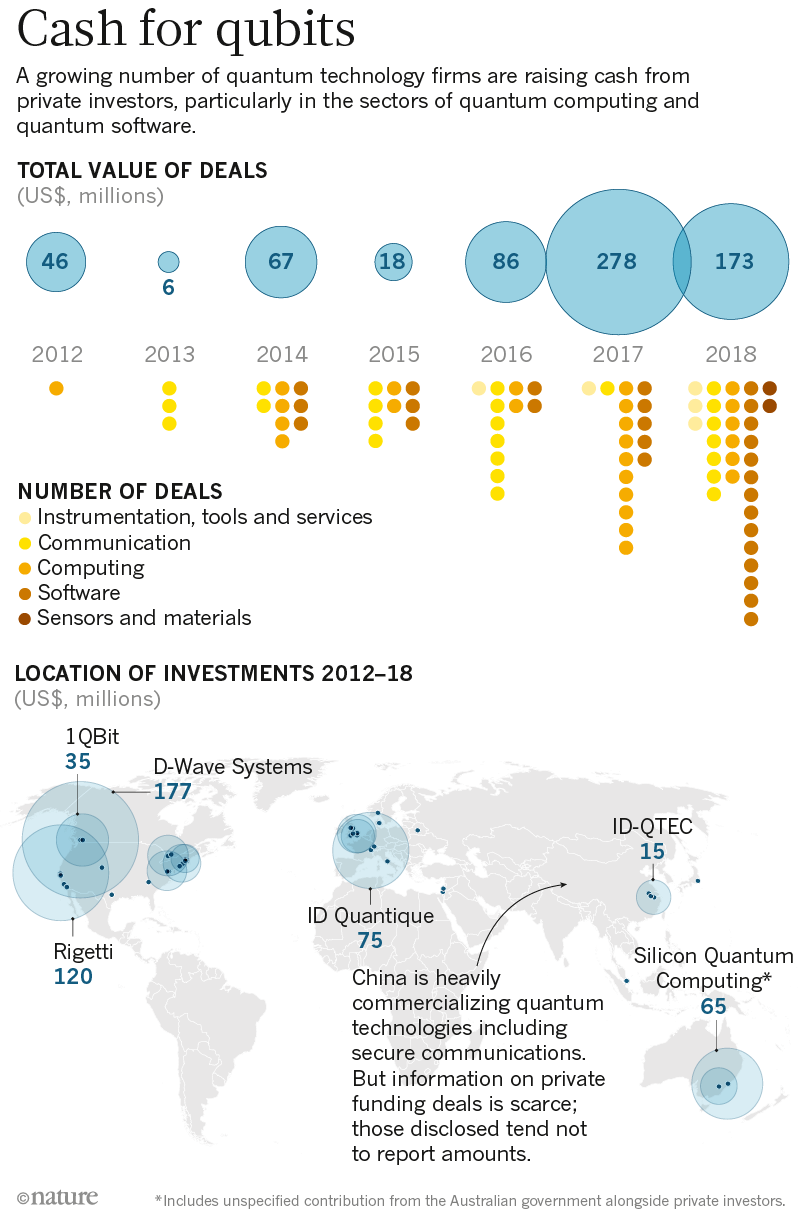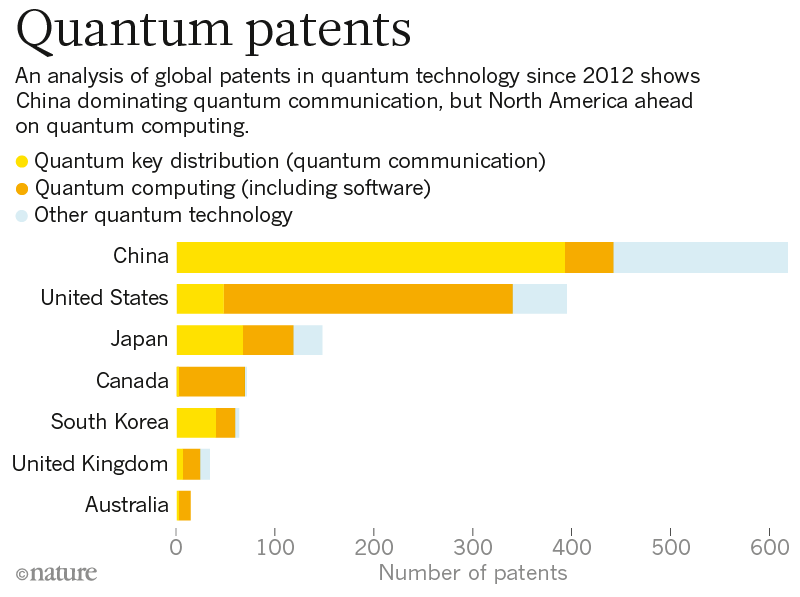
A Nature analysis explores the investors betting on quantum technology.
Robert Schoelkopf spent more than 15 years studying the building blocks of quantum computers until, in 2015, he decided it was time to start constructing one. The physicist and his colleagues at Yale University began pitching their start-up firm Quantum Circuits, Inc. to investors, hoping to persuade venture capitalists that the time was ripe to pour cash into a quantum-computing company. Within two years, the team had secured US$18 million. That was enough to build a specialist laboratory — which opened this January — in a science park near the university in New Haven, Connecticut, and to employ around 20 scientists and engineers.
For Schoelkopf, venture capital (VC) investing was unfamiliar territory. But he’s not the only quantum physicist to make a successful sales pitch. Governments and large technology firms have long nurtured quantum research, and in the past few years have announced billions of dollars for the field. As their support has ramped up, outside investors have looked to get in early on a fledgling industry.
By the start of this year, according to an analysis by Nature, private investors had funded at least 52 quantum-technology companies globally since 2012 — many of them spin-outs from university departments. (Academics have founded many more start-ups that have yet to close deals.) Although the value of some of the cash infusions remains secret, Nature’s analysis captures the scale of recent activity. It finds that, in 2017 and 2018, companies received at least $450 million in private funding — more than four times the $104 million disclosed over the previous two years (see ‘Cash for qubits’). VC makes up the bulk of this cash. Many firms in the VC hub of California’s Silicon Valley have already plunged in, and among the rest, “most are keeping a close eye on quantum”, says Christopher Monroe, a physicist at the University of Maryland in College Park who co-founded the quantum-computing firm IonQ in 2015.

Source: Nature analysis, including data from Quantum Computing Report, Boston Consulting Group, PitchBook and Crunchbase
Few doubt that quantum technologies will eventually yield useful and potentially revolutionary products. Alongside government investments, hundreds of firms are rushing to invest in the field, with big names such as IBM, Google, Alibaba, Hewlett Packard, Tencent, Baidu and Huawei all doing their own research. Google has reportedly now created a quantum computer that can solve specialized problems that would stump even the best classical computer — a landmark known as ‘quantum supremacy’. Secure encryption using quantum technology is already a commercial product, as are some quantum-enabled technologies that sense, image or measure at exquisitely precise scales. One firm, D-Wave Systems in Burnaby, Canada, even sells computers that exploit quantum effects, although these machines specialize in particular tasks known as optimization problems.
But venture capitalists tend to invest in what they hope will be game-changers, such as a multipurpose quantum computer that could handle many kinds of otherwise-unfeasible calculations. From the perspective of investors, the cash pumped into the field annually represents a small outlay so far — on a par with VC investments in artificial-intelligence (AI) firms before 2010, for instance. (By 2018, US VC investments in AI had boomed to $9.3 billion.) Still, these numbers are substantial for an immature field that doesn’t yet have much to sell. Despite this, some software firms are already marketing their work on quantum algorithms, which are written for hardware that does not yet exist.
Many worry that the buzz could turn into a bubble. “There is a lot of hype right now,” says Doug Finke, a computer scientist in Orange County, California, who runs the industry-tracking website Quantum Computing Report. Quantum technologies have seen rapid progress, but machines that can tackle many kinds of computation are still likely to be decades away, and even then it will be difficult to write algorithms that harness their abilities, says Finke.
Some VC investors are betting on a breakthrough that brings general-purpose quantum computers to fruition in five or ten years. Others are banking on making just enough progress for another firm to buy them out. Many also hope scientists can find applications for relatively small, imperfect quantum computers, which might emerge sooner. These would be limited to tackling specific questions, such as simulating a reaction in quantum chemistry or optimizing a financial model. They might not perform better than a classical computer that has unlimited computing resources, but they could still create marketable products.
If these early quantum computers don’t emerge soon with profitable uses, the field could face a “valley of death” in which investment falters, warned a December 2018 report from the US National Academies of Science, Engineering, and Medicine. Some researchers worry about a ‘quantum winter’ similar to the ‘AI winters’ used to describe the lulls that followed surges of interest in that field. There are now hints that US firms are finding it harder to get private funding, says Finke, who notes that seven out of ten deals he has documented this year were outside the country. “There is still a lot of value being created — it’s just a case of whether there is too much hype,” says Christian Weedbrook, founder of the quantum-computing firm Xanadu in Toronto, Canada.

A room-temperature quantum chip from Xanadu, which is developing qubits based on information in light beams (photons).Credit: Xanadu Quantum Technologies Inc.
Quids in for qubits
Quantum technologies have already transformed daily life. Computers, mobile phones, medical imaging, lasers and superconductors all emerged from the scientific revolution of the early twentieth century, when physicists unlocked the inner workings of the atom through quantum mechanics. But today’s generation of quantum technologies go further by manipulating previously untapped and often fragile quantum phenomena. These include superposition, in which particles seem to have multiple states until they are observed, and entanglement, which describes how the properties of quantum systems — such as particles’ spin and polarization — can be inextricably tied together.
Such quantum technologies include unhackable encryption, super-sensitive detection devices and new forms of imaging. The biggest game-changer, if scientists can pull it off, would be a general-purpose quantum computer. By entangling collections of quantum bits, or ‘qubits’, such a machine could perform calculations such as searching databases and factoring large numbers dramatically faster than the best classical computers can. “There are a whole class of problems that will always be impossible unless we have quantum computers,” says Monroe.
To analyse commercial deals in the field, Nature cross-referenced details of quantum start-ups published on market-research websites and in consultancy reports, together with information provided by PitchBook, a market-research firm in Seattle, Washington (see Supplementary information for full data).
Firms developing the physical qubits — the hardware of quantum computing — have received the lion’s share of VC investment. Schoelkopf’s company uses tiny loops of superconducting wire chilled to close to absolute zero for its qubits. This is the most intensively studied set-up for quantum-computing hardware: technology giants Google and IBM, for instance, use the same principles. (Internal research investments by big tech firms are likely to be large, but are not publicly disclosed and so are not included in our analysis.) Google’s biggest quantum computer has 72 qubits, but around one million will be needed for a general-purpose quantum computer. Monroe’s firm uses another long-standing technology: applying magnetic fields to trap ions of ytterbium whose quantum state is read out using lasers.
Other companies focus on different hardware that is at an earlier stage of development, but which might prove easier to manufacture at scale. These are increasingly attracting investment, says Christophe Jurczak, founder and managing partner of Quantonation, a Paris-based venture fund that launched in 2018 and focuses on ‘deep physics’ start-ups. Companies developing qubits based on light and on silicon have received VC investment on the scale of tens of millions of dollars since 2017.
One firm — PsiQuantum in Palo Alto, California — is promising to leapfrog its competitors to create a million-qubit computer in about eight years. Its unusual idea involves making qubits from photons of light guided through grooves etched into silicon chips. The advantage of this approach is that these qubits could be made in existing semiconductor manufacturing plants, says chief executive Jeremy O’Brien, who left his tenured position at the University of Bristol, UK, to co-found the firm in 2016. Although other academics remain sceptical about the company’s claims, O’Brien says it is among the “top handful” of quantum companies in terms of investment, and now employs a workforce of around 100. That might suggest it has raised dozens of millions of dollars, although the company won’t publicly say so.
Quantum software is also proving a lure for private investment, with 20 firms raising more than $110 million across 28 deals from 2012 to the end of 2018. These companies are crafting algorithms that translate problems — such as optimizing the logistics of supply chains or simulating molecules for drug discovery — into software that could be run on early quantum computers. Money for software tends to come from ‘strategic’ VC firms that are part of large corporations. These fund start-ups with the aim of both developing the technology and making profits, says Matt Johnson, chief executive and co-founder of quantum software firm QC Ware in Palo Alto, which raised $6.5 million in 2018. Purely profit-driven VCs aren’t so interested yet, he says.
Several software start-ups have raised tens of millions of dollars each — including Zapata Computing in Cambridge, Massachusetts; 1QBit in Vancouver, Canada; and UK-based Cambridge Quantum Computing. Although no one is yet benefiting from quantum algorithms, some firms are willing to pay to develop them, says Yianni Gamvros, head of business development at QC Ware. That company has already signed contracts in industries such as aerospace, which plans decades ahead, and in finance, where tiny advantages can bring huge gains. The firm is developing algorithms that, on an early quantum computer, could solve those industries’ biggest bottlenecks, he says. Many of the companies are still reeling from the impact of AI on their business. “This seems like a small investment to get ready for another potentially disruptive force,” says Gamvros.
Computing isn’t the only quantum technology attracting funds. Swiss start-up Qnami in Basel, which received $130,000 in 2018 to develop a quantum magnetic microscope using single electrons trapped in synthetic diamond, is one of at least three firms that have raised relatively small amounts of private cash to produce imaging or sensing technologies.
And it’s hard to quantify the investments in one of the hottest quantum fields: communications, which uses entangled photons to create cryptographic keys that enable fundamentally secure data transmission. Thirteen firms that work on secure quantum communications have announced 27 deals that raised cash, but only around half disclosed amounts. The leaders in the field — Chinese firms QuantumCTek in Heifei City and Qasky in Wuhu City, both in Anhui province — have not revealed how much private funding they have received.
In Switzerland, ID Quantique in Geneva installed its first short-range system for the quantum encryption of ballot information in regional elections in 2007. Now, Chinese engineers are taking quantum communications global: expanding on a 2,000-kilometre quantum link that was installed in 2014, and developing a network of quantum satellites after launching the first such craft in 2016. If quantum computers gain the ability to hack the best classical encryption, quantum encryption might prove the only route for secure communications.
Quantum geography
North America has long been the world’s leader in attracting VC cash, and Nature’s analysis shows that the region also dominates private quantum investment. But the boom is not restricted to Silicon Valley. Firms in Canada have attracted $243 million, led by quantum-computing pioneer D-Wave Systems, which alone has raised $177 million. A whole ecosystem has emerged to support quantum companies around academic hubs in Waterloo and Toronto, which have benefited from public and philanthropic investment, tax advantages and successful incubators, says Jurczak. “You get very good vibes and connections there,” he says. A perceived immigration crackdown in the United States is also giving Canada an advantage in attracting talented quantum physicists, says Xanadu’s Weedbrook. “We’re seeing a reverse brain drain to Canada and that’s been great for us,” he says.
The biggest gap in Nature’s analysis is caused by a lack of investment information from China. Reports in English-language media and by Western analytics firms rarely cover deals in China, which often involve state-backed VC firms, so our analysis is likely to miss a large number of contracts there. And in our data, only one in ten fund-raising deals secured by Chinese firms disclosed its value. Commercialization is well under way for many quantum technologies in China, says quantum physicist Jian-Wei Pan at the University of Science and Technology of China in Hefei; QuantumCTek was launched as a spin-out from his lab in 2009.
Patents offer another sign of the activity in China. More than 43% of quantum-technology innovations patented between 2012 and 2017 came from Chinese firms and universities, according to data gathered by the European Commission’s Joint Research Centre in Ispra, Italy. In patenting, China “has been extremely aggressive, especially in areas having to do with communication”, says Celia Merzbacher, who is associate director of the US Quantum Economic Development Consortium in Arlington, Virginia.

Source: Martino Travagnin/EC Joint Research Centre
Elsewhere around the world, private funding mirrors research hotspots — with pockets of investment in Australia, Singapore, the United Kingdom and across Europe. European investors are typically more risk-averse and have smaller budgets, but a €1-billion (US$1.1-billion) flagship, launched by the European Union in 2018, aims to ensure that the region’s strengths in basic research translate to commercial success. Through similar public-investment initiatives, the United States, United Kingdom, Japan, Sweden, Singapore, Canada and China are all ploughing hundreds of millions of dollars into quantum technologies.
Quantum bottleneck
Most university scientists who have founded start-ups, such as Schoelkopf, still spend time on campus, continuing research that could lead to further breakthroughs down the line. Only a few, such as PsiQuantum’s O’Brien, have left academia entirely. Even so, the boom in quantum start-ups means that there are already too few highly qualified quantum engineers to supply the firms — and the industry, such as it is, risks draining academic talent away from universities, as happened in AI, says Xanadu’s Weedbrook. “I think we’re starting to hit a point where we’re concerned about it,” he says. More training is needed: a major strand of the $1.2-billion US National Quantum Initiative, which President Donald Trump signed in December 2018, is to train a new generation in quantum-related jobs.
At the same time, some firms are over-promising on the technology they can deliver, says Monroe. “There’s a lot of hype in the field, a lot of promises that on the face of it look a little ridiculous, and some of that gets funded,” he says.
Researchers wouldn’t name particular efforts they felt were hyped, but Weedbrook pointed to the scale of investment in companies that focus only on quantum software as a sign of an investment bubble; some of them have raised tens of millions of dollars, even though they incur few costs for physical equipment or facilities. “It’s amazing amounts being raised, so it seems to indicate that there is a lot of hype,” says Weedbrook, whose firm develops both quantum hardware and software.
But quantum-software firms argue that their work needs cash for both intensive development and to hire staff. Companies must also cover their costs for longer than the two-year period that a typical funding round is expected to support, says Christopher Savoie, chief executive of Zapata Computing, a quantum-software firm that raised $21 million earlier this year. This is because it remains uncertain when hardware for quantum software will emerge, and because firms need funding to lure scientists away from stable academic positions, he says.
Not everyone is so concerned. O’Brien says that although VC firms might meet with researchers on the basis of buzz, he hasn’t yet seen that translate into bad decisions. And although quantum physics can seem counter-intuitive, these technologies are not inherently harder to understand than many others, he says. “There’s some weird and wacky stuff going on, but there’s weird and wacky stuff going on in a transistor.”
If 2019 data end up showing that private US investment in quantum technology is slowing down, says Finke, that might be because of fears of a quantum winter or the long timeline to profitability for quantum firms. Increased competition between the large number of start-ups could also play a part, or concerns that the US–China trade war might cool the economy, he adds. A hype cycle is mandatory for almost every high-tech market, says Merzbacher, who predicts that “breathless reporting and frothy announcements” are likely to die down. There are solid reasons to think that quantum technologies will create game-changing advances. “It’s a question of the timeline, rather than if that will happen,” she says.
Schoelkopf says that some firms are making grand promises on too short a timeline. But he thinks that estimates on how long it will take to build a general-purpose quantum computer are overly pessimistic. “If you had projected forward from where we were ten years ago, you would never have predicted how far we are today,” he says. Innovative hardware combined with software that picks out the most tractable problems means “we’re going to be reaching useful quantum computations faster than people think”.